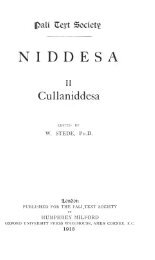Lessons In Practical Buddhism - Sirimangalo.Org
Lessons In Practical Buddhism - Sirimangalo.Org
Lessons In Practical Buddhism - Sirimangalo.Org
Create successful ePaper yourself
Turn your PDF publications into a flip-book with our unique Google optimized e-Paper software.
teachers, refusing to listen and even leaving the meditation<br />
centre without finishing their training simply because of their<br />
inability to withstand criticism. Others become caught up in<br />
their worldly accomplishments, relishing the praise that<br />
comes from involvement in the world, and so are unable to<br />
focus their minds on meditation, thinking only of the<br />
pleasure that comes from being among those who shower<br />
them with praise.<br />
Gain as well can be a great hindrance to meditation if one<br />
worries about ones possessions or if craving for new<br />
possessions arises. Some monks become dissatisfied with<br />
the monastic life because of their remembrance of pleasant<br />
experiences when they were lay people. Some monks<br />
become infatuated with the lives of lay people and give rise<br />
to craving for what seems to be a life of happiness as<br />
compared to the difficult life of a monk. Some monks are<br />
even enticed by rich lay supporters to disrobe, with the<br />
promise of marriage or financial support once they disrobe.<br />
Likewise, those meditators who have much wealth will often<br />
fail to put out any real effort in the practice, unafraid as they<br />
are about the future, thinking that they are already safe and<br />
that their riches will protect them from all dangers. Often<br />
this prevents such people from even attending a meditation<br />
course, since they are unable to see the dangers that await<br />
even rich people if they are negligent.<br />
The same goes for happiness – when we are happy and<br />
comfortable and not faced with any immediate suffering, we<br />
will become complacent. When our meditation practice<br />
becomes difficult, if we are not mindful and see the danger<br />
arising, we will become bored and dissatisfied, thinking only<br />
about the pleasure we could find doing other things. The<br />
Buddha called these things waves because they toss us<br />
about, back and forth, clinging to the good and chasing away<br />
the bad. As long as one allows the mind to be tossed about<br />
in this way, one will never reach the farther shore of safety<br />
and freedom from suffering.<br />
The danger of crocodiles refers to laziness and indolence;<br />
thinking only about our mouth and stomach, unwilling to<br />
strive against even the slightest difficulty. Like a crocodile<br />
with a big mouth, a meditator who is lazy will think only<br />
21












